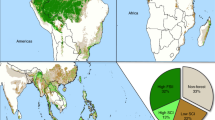Abstract
Ecological studies in tropical production forests suggest that many forests could be successfully managed for timber, biodiversity, and carbon, as long as the targets for timber yield are set realistically low (which they rarely are at present). Plantations of mixed native species are another attempt to combine timber production with other values, although there is little data yet on their long-term success. Ecological restoration is a growing field that combines forestry skills with ecological knowledge. Tropical forest management must also respond to the twin needs for climate-change mitigation (by reducing greenhouse gas emissions or increasing sinks) and adaptation (by maximizing the ability of forest species and ecosystems to adapt to climate change). In most cases, however, the biggest issue in tropical forest management is still governance, rather than ecology.
Similar content being viewed by others
References
Brancalion PHS, Villarroel Cardozo I, Camatta A, Aronson J, Rodrigues RR (2014) Cultural ecosystem services and popular perceptions of the benefits of an ecological restoration project in the Brazilian Atlantic Forest. Restor Ecol 22:65–71
Campoe OC, Iannelli C, Stape JL, Cook RL, Mendes JCT, Vivian R (2014) Atlantic forest tree species responses to silvicultural practices in a degraded pasture restoration plantation: from leaf physiology to survival and initial growth. For Ecol Manage 313:233–242
Corlett RT, Westcott DA (2013) Will plant movements keep up with climate change? Trends Ecol Evol 28:482–488
de Groot RS, Blignaut J, van der Ploeg S, Aronson J, Elmqvist T, Farley J (2013) Benefits of investing in ecosystem restoration. Conserv Biol 27:1286–1293
Edwards DP, Gilroy JJ, Woodcock P et al (2014) Land-sharing versus land-sparing logging: reconciling timber extraction with biodiversity conservation. Glob Chang Biol 20:183–191
IPCC (2014) Climate change 2014: mitigation of climate change. Working group 3 contribution to the fifth assessment report of the intergovernmental panel on climate change. Cambridge University Press, Cambridge
Jordan CF (2005) Tropical forest ecology. Springer, Berlin
Lamb D (2011) Regreening the bare hills: tropical forest restoration in the Asia Pacific Region. Springer, Dordrecht
Manson DG, Schmidt S, Bristow M, Erskine PD, Vanclay JK (2013) Species-site matching in mixed species plantations of native trees in tropical Australia. Agroforest Syst 87:233–250
Medjibe VP, Putz FE (2012) Cost comparisons of reduced-impact and conventional logging in the tropics. J Forest Econ 18:242–256
Menz MHM, Dixon KW, Hobbs RJ (2013) Hurdles and opportunities for landscape-scale restoration. Science 339:526–527
Navarro-Cerrillo RM, Griffith DM, Ramírez-Soria MJ, Pariona W, Golicher D, Palacios G (2011) Enrichment of big-leaf mahogany (Swietenia macrophylla King) in logging gaps in Bolivia: the effects of planting method and silvicultural treatments on long-term seedling survival and growth. For Ecol Manage 262:2271–2280
Nichols JD, Bristow M, Vanclay JK (2006) Mixed-species plantations: prospects and challenges. For Ecol Manage 233:383–390
Peña-Claros M, Fredericksen TS, Alarcón A et al (2008) Beyond reduced-impact logging: silvicultural treatments to increase growth rates of tropical trees. For Ecol Manage 256:1458–1467
Putz FE, Zuidema PA, Synnott T et al (2012) Sustaining conservation values in selectively logged tropical forests: the attained and the attainable. Conserv Lett 5:296–303
Rist L, Shanley P, Sunderland TCH et al (2011) The impacts of selective logging on non-timber forest products. For Ecol Manage 268:57–69
Saha D, Sundriyal RC (2012) Utilization of non-timber forest products in humid tropics: implications for management and livelihood. Forest Pol Econ 14:28–40
Schweizer D, Gilbert GS, Holl KD (2013) Phylogenetic ecology applied to enrichment planting of tropical native tree species. For Ecol Manage 297:57–66
Sist P, Garcia-Fernandez C, Fredericksen TS (2008) Moving beyond reduced-impact logging towards a more holistic management of tropical forests. For Ecol Manage 256:1427–1516
Zimmerman BL, Kormos CF (2012) Prospects for sustainable logging in tropical forests. Bioscience 62:479–487
Author information
Authors and Affiliations
Corresponding author
Editor information
Editors and Affiliations
Rights and permissions
Copyright information
© 2014 Springer-Verlag Berlin Heidelberg
About this entry
Cite this entry
Corlett, R.T. (2014). Applied Ecology of Tropical Forests. In: Köhl, M., Pancel, L. (eds) Tropical Forestry Handbook. Springer, Berlin, Heidelberg. https://doi.org/10.1007/978-3-642-41554-8_55-1
Download citation
DOI: https://doi.org/10.1007/978-3-642-41554-8_55-1
Received:
Accepted:
Published:
Publisher Name: Springer, Berlin, Heidelberg
Online ISBN: 978-3-642-41554-8
eBook Packages: Springer Reference Biomedicine and Life SciencesReference Module Biomedical and Life Sciences




